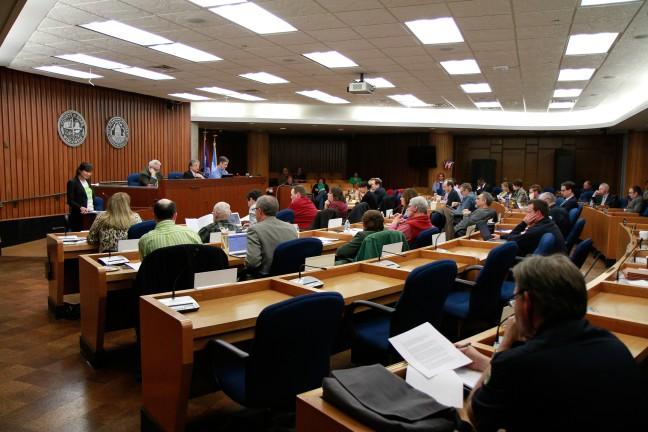The Madison City Finance Committee unanimously voted to recommend $4.1 million in funds for affordable housing developments Monday, and is now waiting for approval from the city council.
The recommendation would award up to $3.225 million from the Affordable Housing Fund and an additional $900,000 from the Federal HOME funds. The recommended funds would go toward three different development projects in the city to produce about 200 affordable housing units.
Alder Mike Verveer, District 4, expressed delight that the recommendation was passed in the committee and said he is “confident that the city council will approve the funding.”
The city council’s efforts to increase affordable housing in Madison have been developing for over six years since the adoption of the New Downtown Plan in 2012. This new recommendation for funds and projects is one of several efforts by the city to increase the amount of affordable units downtown for median and low income households.
“One of the biggest challenges that Madison faces is the lack of affordable housing,” Verveer said. “It affects all types of Madison residents, including absolutely UW students.”
The developers for the affordable housing projects will be selected through a City Request for Proposals process. The finance committee’s recommendation would additionally authorize the city clerk and Mayor Satya Rhodes-Conway to oversee and execute the loan agreements with the chosen developers for the projects, a memo from the Community Development Division said.
The Affordable Housing Fund was added to the City’s 2015 Capital Budget in order to progress the goals and plans of the city to provide more low-income rental housing options. The city council has since used these funds to leverage about $130 million from Low-Income Housing Tax Credits, according to the memo.
The funds generated through LIHTC have gone towards building 1,246 rental units over the past five years. One thousand and ninety-one of those units are currently or will be viable housing options for households in Madison at or below 60% of the County Median Income (CMI), the community development committee memo said.
“Madison, like cities all over the United States, is suffering from an affordable housing crisis,” Verveer said. “This city program, which has been around for many years now, that helps construct new affordable housing is critical. It’s just one piece of the puzzle, but it’s one strategy we have successfully utilized for several years now.”
In anticipation that the Capital Budget for 2020 will allocate $5 million to the Affordable Housing Fund, the Community Development Division issued a CRP in May 2019.
Four developers responded with proposals for affordable housing units. After further review by the City Finance Committee, three of the four proposals are outlined in the recommendation that would be rewarded up to $4.125 million.
According to the resolution, up to $1.4 million would be awarded to Age Better, Inc. and Gorman & Company for an apartment project to create 87 units, focused on aiding senior residents of Madison. 73 of the units would be set aside for households with incomes of 30%, 50% or 60% of the county’s median income.
An additional $1.7 million would be awarded to MSP Real Estate, Inc. for an apartment project to create 111 units, with 94 of those units designated as affordable housing units for households with incomes of 30%, 50% or 60% of the county’s median income, the resolution said.
Finally, up to $1.025 million would be awarded to Movin’ Out, Inc. for an apartment project producing 38 units, with 32 of those units designated as affordable housing units for households with incomes of 30%, 50% or 60% of the county’s median income. Additionally, eight of the units would be designated for households with a permanently disabled member or military veteran, the resolution said.
The final authorization of these projects and allocation of funds from the recommendation depends on the final leveraging of the LIHTC from the city council.


